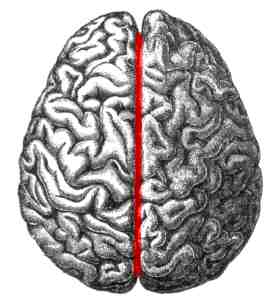

MedFriendly®


Fissure
Fissure has several definitions in the field of medicine.
As a noun, it usually is used to refer to a deep space,
groove, or slit on the surface of an organ. Fissures
often divide an organ into parts. It can be used as a
verb, meaning to make a deep space, groove, or slit.
Fissure also means a lesion in the skin that looks like a
crack. Fissure also refers to a fault that is arranged in
a line(s) that appears on the surface of bone during
development of a part. For example, in dentistry,
fissure means a break or fault that develops in the
outermost covering of the exposed part of the teeth
(known as enamel).
The red line shows the longitudinal fissure
of the brain.
FEATURED BOOK: Neuroanatomy through Clinican Cases, 2nd ed.
A fissure is deeper than a sulcus (a shallow groove), but sometimes the two words are
used to refer to the same thing in the study of the structure of the human body. The most
well known fissure in the brain in the longitudinal fissure (also known as the longitudinal
cerebral fissure and the interhemispheric fissure) which is a deep grove that separates
both hemispheres (left and right halves) of the brain.
Fissural means relating to a fissure. Fissuration is the state of being fissured. Fissure
comes from the Latin word "fissura," meaning "cleft," which is a space or opening made
by or as if by splitting.
"Where Medical Information is Easy to Understand"™















